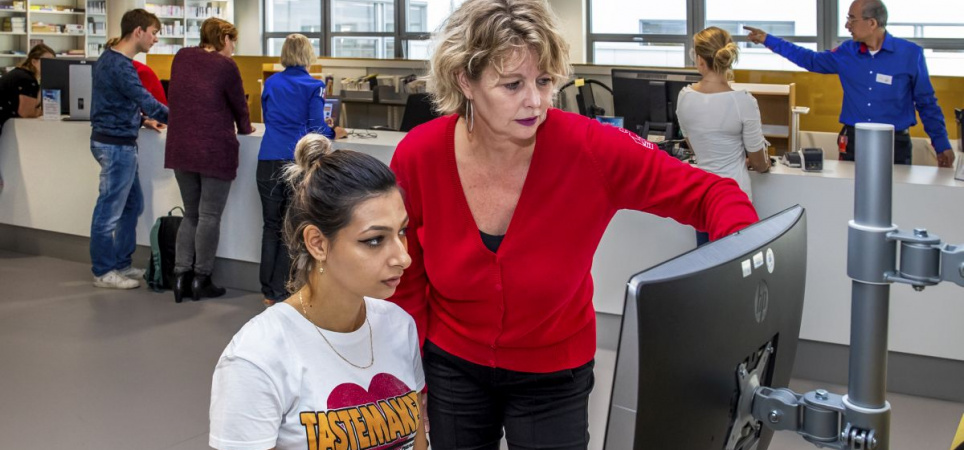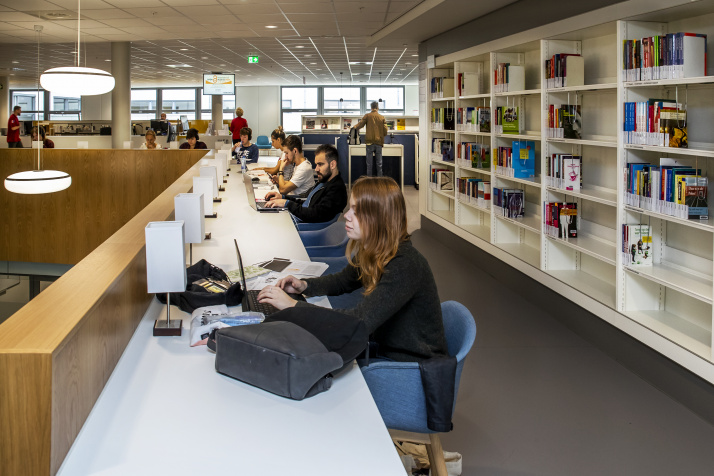The college library is turned upside down
Digitization means a new role for the library in higher education. This has major consequences for employees.

Image: Angeliek de Jonge
In 2017, the libraries of the seven Utrecht faculties were brought together in the Uithof building on Padualaan. A change that was initiated a few years ago in order to become future-proof, explains manager Marianne Kelder. “You don't know exactly what the future will bring. To respond to this, it is more efficient to create one library. A lot of administrative work has been lost due to automation. We use what we save on personnel costs for new forms of service. ”
It was quite a change. After years in the same place, people suddenly have to relate to new colleagues and a different working method.
The desk has remained, but the functions of the employees have changed. Students can contact the Public Service employee behind the desk for general questions. The floor walker then literally and figuratively helps the student to find his way in the databases and the library. And at the institutes themselves there are embedded librarians: information specialists who help students and teachers with their teaching and research questions.
Spicy process
Supporting education and research are two pillars of the library that, according to Kelder, require specialized staff. “Every employee was able to indicate his or her preference and we honored that as much as possible,” she says. “Due to the crisis we unexpectedly had to cut back on all our student assistants, but fortunately we managed to keep everyone else. It was quite a tough process, because it requires quite a change from people. After years in the same place, they suddenly have to relate to new colleagues and a different working method. Actively coming out to help students is quite difficult for library staff who are generally quite modest in nature. There has been a professionalization process for this. "
Transition phase
Despite various rounds of cutbacks at universities of applied sciences, total expenditure on the library increased by 2010 percent between 2017 and 10, according to trend figures from the Samenwerkingsverband Hogeschoollibrotheken (SHB). The number of FTEs per student has remained roughly the same, but the share of information specialists within the total staff has grown by a quarter to 60 percent. The average library employee therefore continues to professionalise.
Spending on printed books has fallen by one third at colleges in recent years.
“The position is shifting to that of an active supporter”, explains Marjan Bonink, SHB vice-president. “This is also due to the introduction of practice-oriented research in higher professional education. How do you store research data, how do you publish about it and how do you ensure that others can reuse the data are new topics that the information specialist can help with. ”
Spending on printed books has fallen by a third at universities of applied sciences in recent years, more than half of the collection (62 percent) now consists of digital sources. There are universities of applied sciences, such as InHolland, that only offer the collection online. The student can therefore only search and reserve books through a system. Most universities of applied sciences still have a 'hybrid collection', as Bonink calls it.
“We are in a transition phase. New students will increasingly be used to working digitally. However, the future is difficult to predict. For example, it is not clear that the paper book would be finished in 2018, in fact, sales in bookstores are on the rise again and students still like to study on paper. ”
Nice
“How wonderful it is that students can still study here among the books”, says Liedeke van Schoot. She works as an embedded librarian at the Utrecht Institute of Paramedical Studies. “The title is a bit warlike, but it is true: my workplace is at the study programs themselves. I help students and teachers with their questions or research and I also teach information skills a lot. ”
More and more information is becoming available online through open access and open science.
She is happy that she no longer has to work behind the counter. “Now I can set my own agenda much more. That's nice, but I no longer belong to a particular team of teachers, it takes some getting used to. The good thing is that I now have much more contact with students and teachers, the lines are shorter. ”
More and more information is becoming available online through open access and open science. A well-known medical database, for example, contains about 30 million articles, which she says requires some of your skills such as searching, selecting and assessing for relevance and correctness. “Not everything has become easier because of digitization, not even for us,” says Van Schoot, who has been in the business for over 35 years. “Sometimes we do not get clear what we have in house, because the search systems are not properly linked. We also pay attention to this in the lessons. ”
Trots
A girl peers at the screen of the information pillar 'Hugo'. She doesn't know the author of the English book she's looking for. "It doesn't matter," explains floorwalker Carla van Oostrum. "You can also search by title in the system via the touchscreen." Van Oostrum is also coordinator of the public service to which the information desks and floorwalkers belong. “It is a gigantic transition for everyone that is still going on. I am extremely proud of the steps we have taken. ”

The library of the 7 Utrecht facilities brought together in the Uithof building
Hundreds of students visit the library every day, but that number quickly exceeds a thousand during exam time. Opening hours have been extended to meet demand. For example, the library is open until 21 p.m. and also on Saturdays during the day. “So far, filling in the roster has been going very well,” says Van Oostrum. “We will soon be holding a test on Sunday and that schedule was even filled in at once. That is the advantage that we are with so many different people. ”
VR goggles
Eddy the education robot is ready for use in the Hub lab on the second floor, where VR glasses, programmable bee robots and a table-shaped touchscreen are also available. The Hub lab is the latest form of library services. Students and teachers of all courses can try out and use the innovative tools, apps and learning materials.
The employees supervise activities and give tailor-made workshops. For example, Optometry students conducted research into the effects on the eye after using VR glasses and students learned to create art therapy creatively with 3D pens. “The Hub lab has been around for 1,5 years now and we are already growing out of our jacket,” says Bianca Pannekoek, manager information specialists and Hub lab. “We offer inspiration and the possibilities to integrate 21st-century skills into the curriculum. In addition, we want to provide an overview of what is happening in digital innovation within the courses, so that knowledge exchange is stimulated even more. So many beautiful things are happening, it is great fun to be involved in this. This service gives a new impetus to the library. ”


